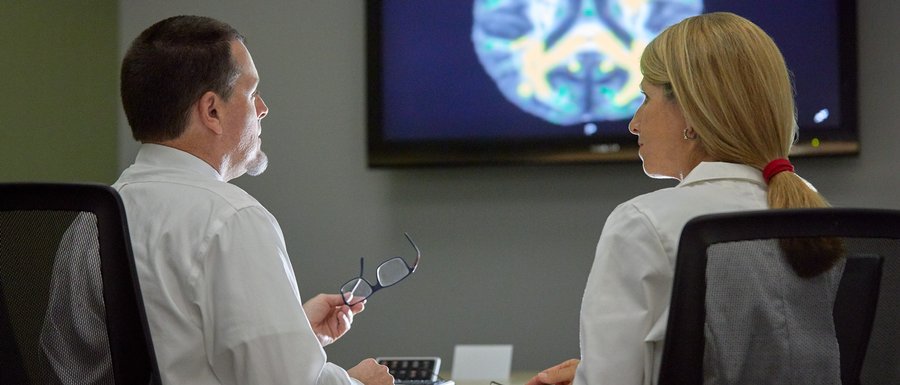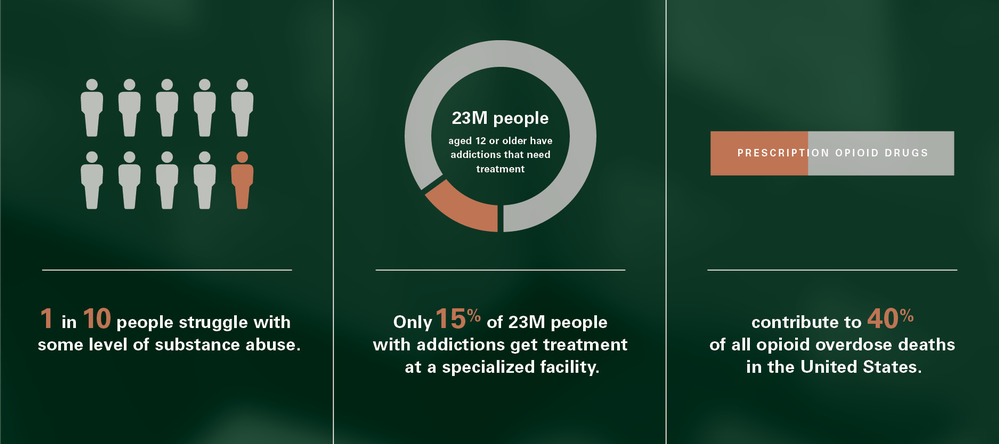Addressing a Growing Crisis: Merging Biological and Cognitive Science to Tackle Addiction

Schmitz and Lane are leading innovative research to better understand addiction and how best to treat it.
Addiction, one of the leading behavioral disorders, takes a heavy toll on individuals, their families, and entire communities. When caught in the downward spiral of addiction—whether to drugs or alcohol—families suffer because of destructive behavior, diminished health, and problems at home or work. Furthermore, the community suffers from increased crime, which contributes to our already overcrowded penitentiaries, and the economy hurts from lost work.

Joy M. Schmitz, PhD.
Louis A. Faillace, MD Professor, Department of Psychiatry and Behavioral Sciences
Director, CNRA
“It’s such a prevalent problem. You can’t ignore it. It affects us on so many levels,” says clinical psychologist and researcher Joy M. Schmitz, PhD.
Often stigmatized, this growing crisis plagues Houston—and all of Texas. “One of the longstanding misconceptions about addiction is that it is a problem of will, a problem of character,” explains Scott D. Lane, PhD, who studies the biology behind addiction. “Even though we are in the 21st century, there are people who still harbor those misconceptions.”
Solving this complex brain disorder will take a comprehensive and collaborative approach linking biology with psychological, social, and behavioral aspects to address the growing crisis. And that’s exactly what Schmitz and Lane set out to do.

Scott D. Lane, PhD
Professor & Vice Chair fr Research, Psychiatric & Behavioral Sciences
Director of Neurobehavioral Laboratory, CNRA
Director of Research, UTHealth Harris County Psychiatric Center
The keystone of their efforts resides in the Center for Neurobehavioral Research on Addiction, a hub of expertise and discovery on substance use and addiction with a multidisciplinary team of researchers and health practitioners located within McGovern Medical School at UTHealth. The center has a number of core focus areas, among which is community outreach.
“While we study a number of classes of drugs to determine mechanisms and possible treatment options, we are a center,” says Lane. “As a center, we need to be flexible enough to respond to the needs of our local and national community.” In fall 2018, Schmitz and Lane, along with other researchers from the center, joined forces with John A. Harvin, MD, and the Department of Surgery at McGovern Medical School to launch a priority project in the fight against the prescription opioid misuse crisis. Almost everyone who undergoes a traumatic surgery will walk away with an opioid prescription. Some of those people will start abusing opiates and become at risk for overdose. Statistically, as many as one in five patients develop long-term opioid abuse or dependence following surgery.
“It’s a combination of the fact that these people have had major surgery, so they receive major pain medications, and they have also been through a traumatic event, such as a major car accident or being shot,” says Lane. “So, the combination of biological and psychological factors that puts them at an increased risk.” Using tools from addiction science, Schmitz and Lane are screening and identifying those at high risk. The simple but critical first step in this process is to assess a short list of key variables, including the history of drug use and psychiatric conditions. This assessment is administered to every patient admitted for surgery. At two weeks and four weeks, they will use mobile technology to follow up with the patients on their recovery.
“Then, we would like to establish patient navigation services to help those patients who are at highest risk for opiate abuse to access care at our clinic and address their pain medication and psychological needs to make a safe transition,” adds Schmitz.
Researchers at the center will be among the first in the nation to perform a systematic and scientific application to understand how we can best predict who is at risk following trauma surgery. At this point, however, there is a clear need for pain management or possible addiction treatment after hospitalization, but a lack of coordination in delivering these services. This is where philanthropy can play an important role by helping to establish this translational service.
“When we can show how the brain of someone suffering from addiction is different from someone who isn’t, that’s a biological marker, not a problem of character,” says Lane. “When we have good markers, we can move forward, merging biological and cognitive science to address a widely misunderstood problem.”
Core Areas of Focus
UTHealth is poised to advance the causes that matter most to our community, and this has never been more true than in understanding and overcoming substance use disorders. By improving outcomes, we hope to break the cycle of chronic recidivism that too many of our patients fall into. The generosity of our donors can help fuel life-changing research in the center’s core focus areas to bring treatments to individuals and their families sooner.
- Genetics/cellular biology to understand the role of genetic, epigenetic, cellular, and environmental variation in addiction
- Behavioral neuroscience to identify neurobiological and behavioral mechanisms of addiction and treatment effects
- Biostatistics/bioinformatics to provide support in research methods and biostatistics
- Clinical trials to develop and evaluate behavioral and pharmacological treatment interventions
- Public health/community outreach to make evidence-based treatment services more accessible and to disseminate research-based knowledge to the community
- Education and training to prepare the next generation of addiction scientists, treatment providers, and Leaders
- Administration and regulatory affairs to integrate activities across the cores and to assure regulatory compliance

Written by: Mika Stepankiw